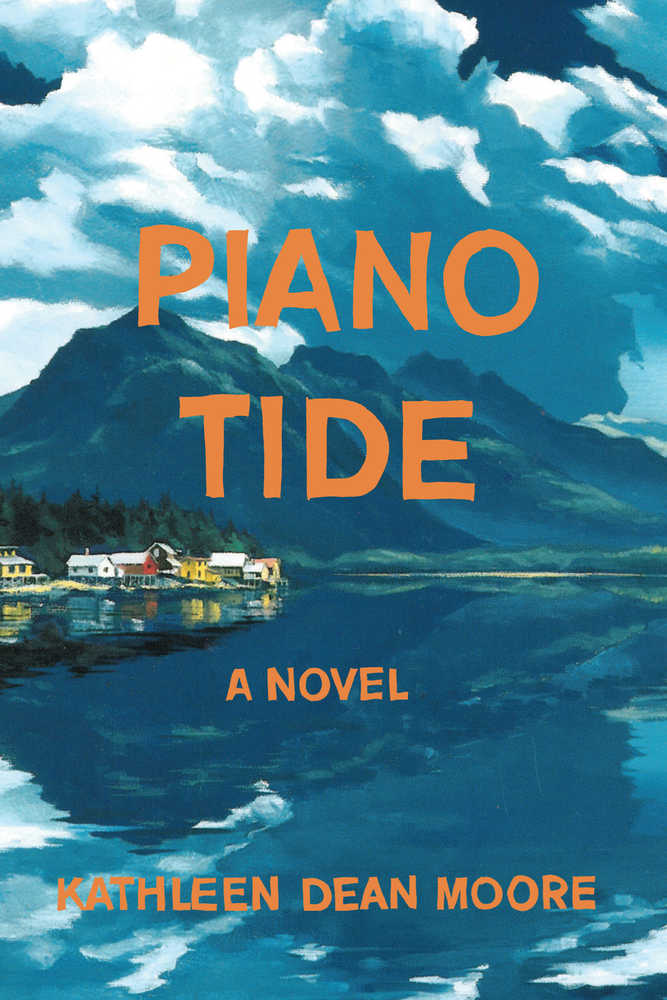A woman with a piano, a dog, and not much else ferries into a tiny Southeast Alaskan village. The townspeople — a grumpy, shouting philosopher in a wheelchair; a burly, jobless, fix-it-all man; a teenage would-be bear guide with a secret girlfriend — watch the woman arrive and help her haul her piano onto the porch of her cabin.
Then Axel, a local businessman, decides to dam a salmon stream and cage a wild bear for a tourist attraction, and the woman with the piano, and her new friends, have to decide what they’ll do about it.
That’s the premise of “Piano Tide,” environmental ethicist and writer Kathleen Dean Moore’s first book of fiction.
“For a long time I’ve been writing books and speeches and harangues about stopping climate change and extinctions, and it’s all been very abstract, and I’ve been saying really abstract things like ‘stand strong against the corporate plunder of the planet,’” Moore said. “And it seemed to me I really needed to know what that meant. How do people do that? How do they make the plans? What does it cost them? What regrets will they have?”
Moore, until recently a professor of environmental ethics at Oregon State University, spends her summers on Chichagof Island in Southeast Alaska (her author bio says she “writes from a small cabin where two creeks and a bear trail meet a tidal cove”).
She first came to Southeast Alaska as a writer in residence at the Island Institute in Sitka in 2006. She worked on “Piano Tide” for 8-10 years, she estimates.
Initially, each of her characters represented a different theory of environmental ethics. Axel, for instance, represented the anthropocentric point of view, she said.
(An anthropocentric view is one that “regards humankind as the central or most important element of existence, especially as opposed to God or animals,” according to an online definition.)
But “as soon as I started to get these characters fleshed out, they refused to be pigeonholed,” Moore said. “I wanted all my characters to be complex that always, they were trying to do the right thing…. I spent years and years making these people into people the readers would care about, until I couldn’t write about them without laughing and crying.”
Moore said the point she considers most important is that “there has to be a better way.”
“It’s not that we can’t cut trees, but we can do that honorably,” she said. “It’s not that we can’t fish, but we can’t fish out the breeds. We need to find a way towards a sustainable, honorable harvest, which is entirely possible if we start questioning our presupposition about who deserves what.”
Home is a central theme in the narrative, as is the consequence of taking action, and music itself. There’s a beautiful passage in which Moore draws parallels between the tuning of a piano and the environment.
Much of Moore’s knowledge about music is due to her friend Rachelle McCabe, a concert pianist, Moore said. The two have been touring together on a program about extinction.
“She has taught me so much about music,” Moore said. “It’s been thrilling for me… I see things differently.”
The art on the cover is by Juneau painter Dick Zagars.
Also, “Because there’s so much music in the book, I’ve been trying to bring a musician to the stage” when she reads, Moore said.
She’ll be reading in Juneau at Hearthside Bookstore in the Nugget Mall at 6 p.m.. Juneau musician Linda Buckley will perform with her. Monday, Feb. 6 at 7 p.m., she’ll be reading with musician Libby Roderick in Anchorage at 49th State Brewing Co., Barrell Room East, 717 W. 3rd Ave., sponsored by 49 Writers. The event is free for 49 Writers members; there’s a $5 donation suggested for attendees who are not members. There’s a cash bar, and doors open at 6:30 p.m. Other reading locations haven’t yet been decided.
Some of Moore’s books are “Riverwalking: Reflections on Moving Water,” “Holdfast: At Home in the Natural World;: “The Pine Island Paradox,” “Wild Comfort,” and “Great Tide Rising.” She’s won the Pacific Northwest Book Award, Sigurd Olson Nature Writing Award and Oregon Book Award for Creative Nonfiction.
Moore is now working on the sequel to “Piano Tide.”
“I didn’t think I would,” she said. “The characters just walked into my life laughing, so what can you do then?”
• Contact Capital City Weekly managing editor Mary Catharine Martin at maryc.martin@capweek.com.

